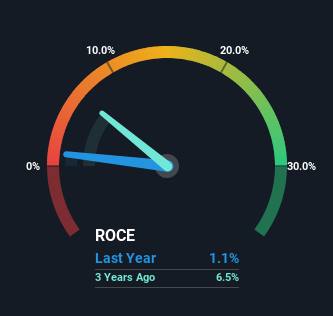- China
- /
- Communications
- /
- SHSE:688592
ComNav Technology (SHSE:688592) May Have Issues Allocating Its Capital
Did you know there are some financial metrics that can provide clues of a potential multi-bagger? In a perfect world, we'd like to see a company investing more capital into its business and ideally the returns earned from that capital are also increasing. This shows us that it's a compounding machine, able to continually reinvest its earnings back into the business and generate higher returns. In light of that, when we looked at ComNav Technology (SHSE:688592) and its ROCE trend, we weren't exactly thrilled.
Return On Capital Employed (ROCE): What Is It?
For those that aren't sure what ROCE is, it measures the amount of pre-tax profits a company can generate from the capital employed in its business. To calculate this metric for ComNav Technology, this is the formula:
Return on Capital Employed = Earnings Before Interest and Tax (EBIT) ÷ (Total Assets - Current Liabilities)
0.011 = CN¥11m ÷ (CN¥1.2b - CN¥182m) (Based on the trailing twelve months to September 2024).
So, ComNav Technology has an ROCE of 1.1%. In absolute terms, that's a low return and it also under-performs the Communications industry average of 4.1%.
Check out our latest analysis for ComNav Technology

While the past is not representative of the future, it can be helpful to know how a company has performed historically, which is why we have this chart above. If you'd like to look at how ComNav Technology has performed in the past in other metrics, you can view this free graph of ComNav Technology's past earnings, revenue and cash flow.
What Can We Tell From ComNav Technology's ROCE Trend?
In terms of ComNav Technology's historical ROCE movements, the trend isn't fantastic. Over the last five years, returns on capital have decreased to 1.1% from 12% five years ago. Although, given both revenue and the amount of assets employed in the business have increased, it could suggest the company is investing in growth, and the extra capital has led to a short-term reduction in ROCE. If these investments prove successful, this can bode very well for long term stock performance.
On a side note, ComNav Technology has done well to pay down its current liabilities to 15% of total assets. That could partly explain why the ROCE has dropped. What's more, this can reduce some aspects of risk to the business because now the company's suppliers or short-term creditors are funding less of its operations. Since the business is basically funding more of its operations with it's own money, you could argue this has made the business less efficient at generating ROCE.
What We Can Learn From ComNav Technology's ROCE
Even though returns on capital have fallen in the short term, we find it promising that revenue and capital employed have both increased for ComNav Technology. These growth trends haven't led to growth returns though, since the stock has fallen 29% over the last year. So we think it'd be worthwhile to look further into this stock given the trends look encouraging.
On a final note, we've found 1 warning sign for ComNav Technology that we think you should be aware of.
While ComNav Technology isn't earning the highest return, check out this free list of companies that are earning high returns on equity with solid balance sheets.
The New Payments ETF Is Live on NASDAQ:
Money is moving to real-time rails, and a newly listed ETF now gives investors direct exposure. Fast settlement. Institutional custody. Simple access.
Explore how this launch could reshape portfolios
Sponsored ContentNew: AI Stock Screener & Alerts
Our new AI Stock Screener scans the market every day to uncover opportunities.
• Dividend Powerhouses (3%+ Yield)
• Undervalued Small Caps with Insider Buying
• High growth Tech and AI Companies
Or build your own from over 50 metrics.
Have feedback on this article? Concerned about the content? Get in touch with us directly. Alternatively, email editorial-team (at) simplywallst.com.
This article by Simply Wall St is general in nature. We provide commentary based on historical data and analyst forecasts only using an unbiased methodology and our articles are not intended to be financial advice. It does not constitute a recommendation to buy or sell any stock, and does not take account of your objectives, or your financial situation. We aim to bring you long-term focused analysis driven by fundamental data. Note that our analysis may not factor in the latest price-sensitive company announcements or qualitative material. Simply Wall St has no position in any stocks mentioned.
About SHSE:688592
ComNav Technology
Develops, manufactures, and sells global navigation satellite system (GNSS) original equipment manufacturer boards, receivers, and solutions for high precision positioning applications worldwide.
Excellent balance sheet and fair value.
Market Insights
Weekly Picks

Early mover in a fast growing industry. Likely to experience share price volatility as they scale


A case for CA$31.80 (undiluted), aka 8,616% upside from CA$0.37 (an 86 bagger!).


Moderation and Stabilisation: HOLD: Fair Price based on a 4-year Cycle is $12.08
Recently Updated Narratives


Positioned to Win as the Streaming Wars Settle

Meta’s Bold Bet on AI Pays Off

ADP Stock: Solid Fundamentals, But AI Investments Test Its Margin Resilience
Popular Narratives


Crazy Undervalued 42 Baggers Silver Play (Active & Running Mine)


NVDA: Expanding AI Demand Will Drive Major Data Center Investments Through 2026


The AI Infrastructure Giant Grows Into Its Valuation
Trending Discussion




